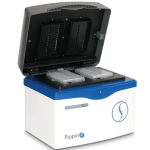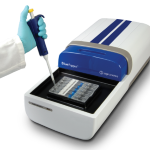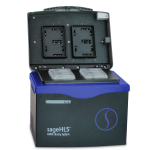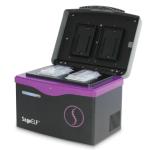Association of MicroRNAs with Antibody Response to Mycoplasma bovis in Beef Cattle
August 2016
Authors:
Eduardo Casas, Guohong Cai, Larry A. Kuehn, Karen B. Register, Tara G. McDaneld, John D. Neill
Info:
USDA scientists performed a longitudinal study of young cows to identify microRNAs linked to a serum antibody produced after exposure to a common pathogen. Their analysis detected miRNAs that may have diagnostic value, as well as ones that may help boost productivity in cattle. MiRNAs were sequenced on an Illumina HiSeq after being size-selected with Pippin Prep.
Citation:
PLoS One 11(8): e0161651
doi:10.1371/journal.pone.0161651
Comparative genomics and transcriptomics of Pichia pastoris
August 2016
Authors:
Kerry R. Love, Kartik A. Shah, Charles A. Whittaker, Jie Wu, M. Catherine Bartlett, Duanduan Ma, Rachel L. Leeson, Margaret Priest, Jonathan Borowsky, Sarah K. Young and J. Christopher Love
Info:
To provide a foundation for engineering the production host Pichia pastoris, scientists sequenced, analyzed, and annotated three commonly used varieties known as Pichia: Komagataella pastoris and two versions of Komagataella phaffii. Pippin Prep was used to size libraries to 180 bp prior to sequencing with Illumina.
Citation:
BMC Genomics 2016 17:550
DOI: 10.1186/s12864-016-2876-y
RADcap: sequence capture of dual-digest RADseq libraries with identifiable duplicates and reduced missing data
August 2016
Authors:
Hoffberg SL, Kieran TJ, Catchen JM, Devault A, Faircloth BC, Mauricio R, Glenn TC
Info:
In this methods paper, scientists combine double-digest RAD-seq with capture technology to reduce costs and increase efficiency. The protocol, which was validated on large sets of Wisteria plants, uses Pippin Prep to enable massively parallel genotyping.
Citation:
Mol Ecol Resour. 2016 Sep;16(5):1264-78
doi: 10.1111/1755-0998.12566
Complete Genome Sequence of a Klebsiella pneumoniae Strain Carrying blaNDM-1 on a Multidrug Resistance Plasmid
July/August 2016
Authors:
Sean Conlan, Anna F. Lau, NISC Comparative Sequencing Program, Tara N. Palmore, Karen M. Frank, and Julia A. Segre
Info:
NIH scientists sequenced the genome of the first blaNDM-1-positive strain of Klebsiella pneumoniae detected in the institute’s hospital. They found three plasmids, one of which included the blaNDM-1 gene conferring resistance to carbapenems. Sequencing was performed with PacBio, and size selection was done with BluePippin for building long-read libraries.
Citation:
Genome Announc. July/August 2016 vol. 4 no. 4 e00664-16
doi: 10.1128/genomeA.00664-16
Circulating Extracellular RNA Markers of Liver Regeneration
July 2016
Authors:
Irene K. Yan, Xue Wang, Yan W. Asmann, Hiroaki Haga, Tushar Patel
Info:
Mayo Clinic researchers performed partial hepatectomies in mice and then monitored RNA activity in serum samples to find a signature associated with liver regeneration. They found detectable changes in small non-coding RNAs such as microRNA, snoRNA, tRNA, and more. The team used Pippin Prep to fractionate RNA libraries prior to sequencing with Illumina MiSeq.
Citation:
PLoS ONE 11(7): e0155888.
doi:10.1371/journal.pone.0155888





